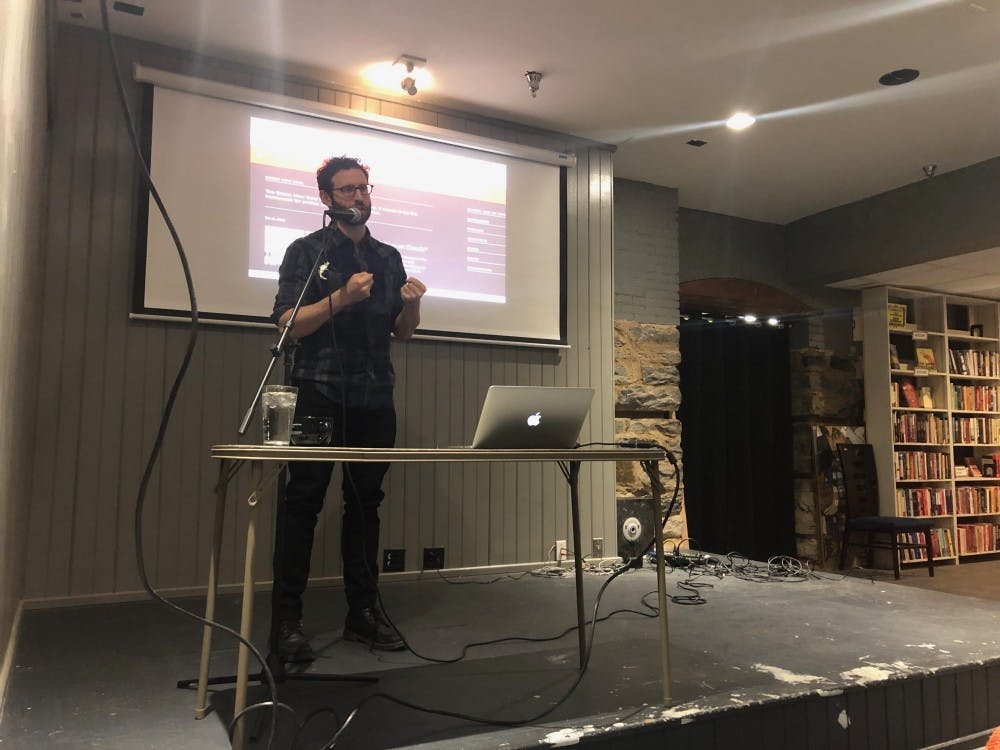Daniel Aldana Cohen, an associate professor of Sociology from the University of Pennsylvania, discussed the intersection of climate change and inequality at Red Emma’s on Wednesday. The talk, titled “A Green New Deal, from the Left,” focused on the potential impact of climate change on housing in the U.S.
On Feb. 7, Representatives Alexandria Ocasio-Cortez and Ed Markey proposed the Green New Deal, aiming to shift the United States toward 100 percent zero-emission energy sources, create new jobs and target improvements to lower-income communities. Over the past year, the Green New Deal has been trending on Twitter and national news, causing speculation over whether it can be adopted as a viable strategy for the Democratic Party.
Cohen discussed the restructuring of the Green New Deal in order to tackle the housing crisis. He believes the Green New Deal cannot achieve economic justice without addressing housing.
“Ten million families in the United States spend 80 percent of wages on rent,” Cohen said. “Because housing is just as important to economic insecurity as jobs are, housing belongs at the core of the Green New Deal.”
Cohen predicts that climate change will displace 13 million people in this country. He went on to indicate that the more damaging effects of climate change will target lower-income communities of color.
“The tradition of redlining is really huge here. We’re going to have a really great migration because of displacement,” Cohen said.
A growing suggestion to the housing crisis is urban density. Urban density is supposed to ensure affordable housing by reducing vacancy, bringing down housing prices and minimizing transportation time. Cohen thinks otherwise.
“If you have capitalists buying markets and you build up private luxury condos, all you’re doing is literally squashing the carbon around,” said Cohen. “You take poor people and people of color. You displace them from urban poor — this is already happening — and you replace them with yuppies who buy iPads and fly around the world, and it has nothing to do with carbon footprint. You need to reorganize cities in total.”
Cohen calls the urban and rural divide within the climate change movement the “eco-apartheid.” In order to avoid such a phenomenon, he envisions a cooperative development between rural and urban areas.
“Urbanites have an obligation to start organizing and make sure we’re transforming the rural landscapes of America, and that it is done in a democratic way that helps everybody,” he said. “It’s true that some of the opposition is coming from Trump voters — not exactly low-income but suburbanites — but it’s also true that you have class struggle around rural development.”
Based on Cohen’s past trips to various land projects, such as the Karl Marx-Hof in Vienna, Rotterdam Resilience Strategy and the Amalgamated Dwellings in New York City, Cohen believes such cooperative development is possible. With punishing real estate taxes and public uses over land, these land projects aspire to create a different economic system for themselves.
“Housing has a huge amount of need and huge amount of potential,” Cohen said. “The details of this are not about being cost effective. It’s about labor of love.”
For Quinn Lester, a graduate student of Political Science, attended the talk. He appreciated the alternative take on the Green New Deal, which went beyond investing in infrastructure and green jobs.
“Politicians really have not thought through that a new green energy grid will be massively disruptive in rural areas that already are suspicious of government planning,” he said.
Tori Junkin, an employee at the IDEXX VetLab Station and Baltimore resident, attended the talk because she is interested in Cohen’s perspective on housing and climate change.
“I am looking at spaces in the area, and the rent is ridiculous,” she said.
Cohen concluded his talk by restating the relevance of climate change and housing inequality to broader U.S. politics.
“The agenda for the post-Trump life is really a fight over the future about climate,” Cohen said. “The right has done a good job of creating false boundaries, and the left’s job is to break them.”





